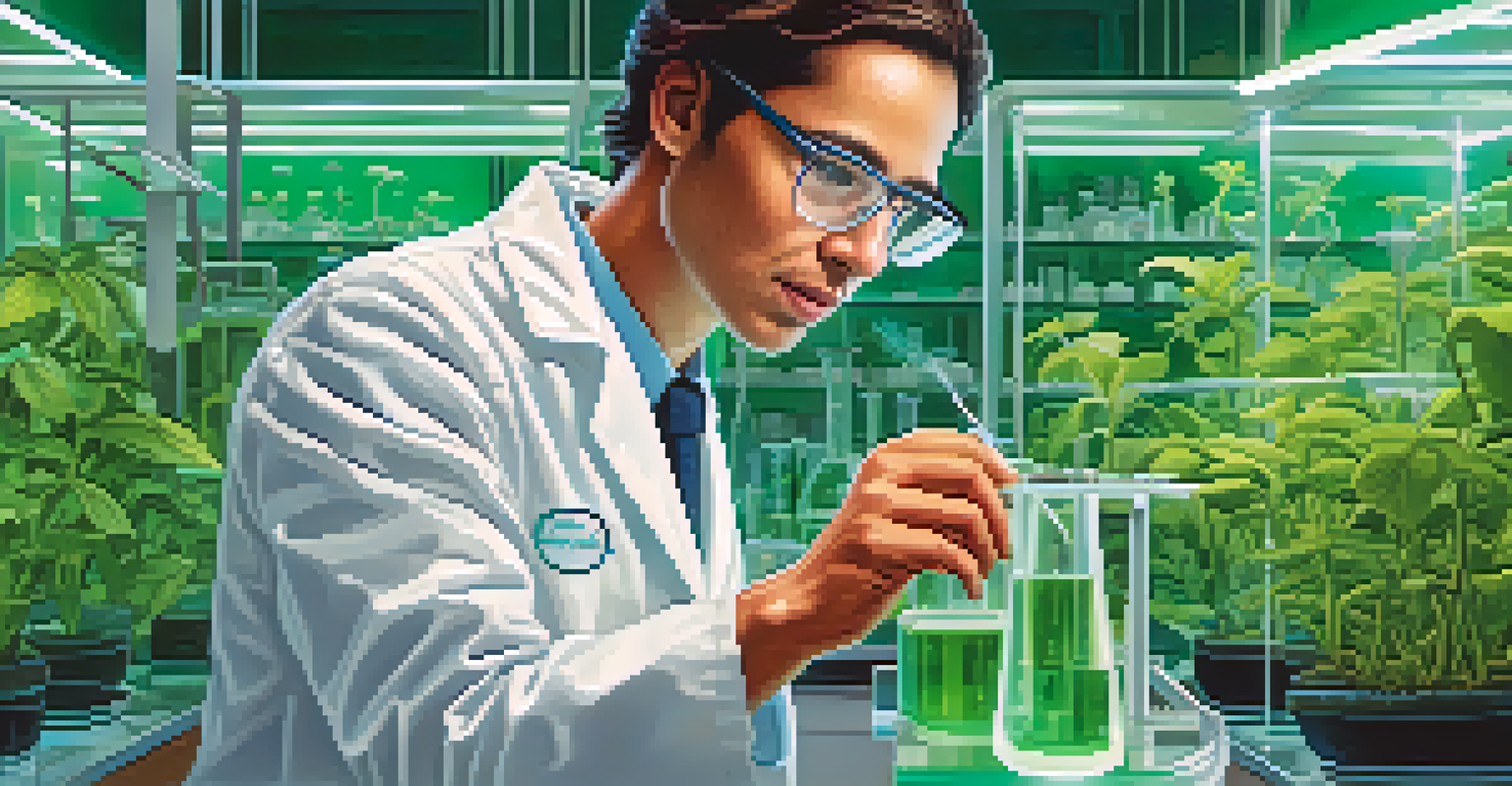Using CRISPR Technology in Breeding Stress-Resilient Plants

Understanding CRISPR Technology and Its Applications
CRISPR, or Clustered Regularly Interspaced Short Palindromic Repeats, is a groundbreaking tool in genetic engineering. It allows scientists to edit genes with precision, making it easier to introduce desirable traits in plants. Think of CRISPR as a pair of molecular scissors that can cut DNA at specific locations, allowing for targeted modifications.
Innovation is the ability to see change as an opportunity - not a threat.
This technology has revolutionized various fields, including agriculture, where it plays a crucial role in developing crops that can withstand environmental stresses. For instance, researchers can use CRISPR to enhance drought resistance, making crops more resilient in changing climates. This targeted approach is not only efficient but also reduces the time needed for traditional breeding methods.
Overall, CRISPR's ability to edit genes quickly and accurately opens up exciting possibilities for creating stress-resilient plants. As we face increasing challenges such as climate change and resource scarcity, the need for innovative solutions in agriculture has never been more urgent.
The Importance of Stress-Resilient Plants
Stress-resilient plants are essential for food security in our increasingly unpredictable world. Factors like drought, salinity, and pest infestations can significantly reduce crop yields, threatening our food supply. By developing plants that can thrive under these adverse conditions, we can ensure a stable food source for growing populations.

Moreover, stress-resilient crops can help farmers maintain productivity without resorting to harmful chemicals or excessive water use. For instance, a drought-resistant variety of wheat can survive with less irrigation, saving precious water resources. This not only benefits farmers but also contributes to sustainable agricultural practices.
CRISPR Revolutionizes Agriculture
CRISPR technology allows precise gene editing, enabling the development of crops that are resilient to drought and pests.
In essence, investing in stress-resilient plants is a proactive measure against future agricultural challenges. With global food demands on the rise, such innovations are vital for fostering resilient ecosystems and safeguarding our planet's health.
How CRISPR Enhances Drought Resistance in Crops
Drought is one of the biggest threats to agriculture, making it crucial to develop crops that can withstand dry conditions. CRISPR technology enables scientists to identify and modify the genes responsible for drought tolerance in plants. By altering these genes, researchers can enhance a plant's ability to retain water and maintain growth even in arid environments.
The greatest threat to our planet is the belief that someone else will save it.
For example, scientists have successfully used CRISPR to create rice varieties that require less water while maintaining yield levels. This not only supports farmers in drought-prone areas but also helps reduce the environmental impact of irrigation. Imagine a farmer cultivating rice in a region that typically struggles with water scarcity—this technology could change their livelihood.
As we continue to explore the potential of CRISPR in breeding drought-resistant plants, we open doors to more sustainable agricultural practices. This approach could ultimately lead to healthier ecosystems and a more secure food future.
CRISPR's Role in Developing Pest-Resistant Crops
Pests can wreak havoc on crops, leading to significant losses for farmers and increased food prices for consumers. CRISPR technology offers a promising solution by allowing for the precise modification of genes that confer pest resistance. Through targeted gene editing, scientists can enhance a plant's natural defenses against common agricultural pests.
For instance, researchers have used CRISPR to develop varieties of cotton that are less susceptible to harmful insects. This not only reduces the need for chemical pesticides but also promotes a healthier environment. Imagine a world where farmers can cultivate crops with built-in pest resistance, leading to safer food and reduced chemical runoff into our waterways.
Importance of Stress-Resilient Plants
Developing stress-resilient plants is essential for ensuring food security amid challenges like climate change and resource scarcity.
By harnessing CRISPR for pest resistance, we can create a more sustainable agricultural landscape. This innovation not only benefits farmers economically but also contributes to the overall health of our ecosystems.
The Challenges of Implementing CRISPR in Agriculture
While CRISPR technology holds immense potential, its implementation in agriculture is not without challenges. Regulatory frameworks for genetically modified organisms (GMOs) can vary significantly across countries, affecting how CRISPR-edited crops are perceived and utilized. Navigating these regulations can be a daunting task for scientists and agricultural companies alike.
Additionally, public perception plays a crucial role in the acceptance of CRISPR technology. Many consumers are wary of GMOs and may have concerns about the safety and ethics of gene editing. It's essential to engage in open dialogues with the public to address these concerns and highlight the benefits of CRISPR in promoting food security and environmental sustainability.
Ultimately, overcoming these challenges will require collaboration between scientists, policymakers, and the public. By working together, we can harness the full potential of CRISPR technology to benefit agriculture and society as a whole.
Future Prospects: CRISPR and Global Food Security
As we look toward the future, the role of CRISPR in ensuring global food security becomes increasingly vital. With the global population projected to reach nearly 10 billion by 2050, the demand for food will soar. CRISPR technology provides a pathway to developing crops that are not only resilient but also high-yielding and nutritious.
Innovations in CRISPR applications can lead to crops that are better equipped to handle environmental stressors while meeting the nutritional needs of diverse populations. For instance, researchers are exploring ways to enhance the nutritional content of staple foods like rice and maize, making them more beneficial for consumers worldwide.
Ethics of CRISPR in Farming
The advancement of CRISPR in agriculture raises ethical questions about biodiversity, local farming practices, and the impact on smallholder farmers.
In summary, CRISPR's potential to revolutionize agriculture could be a game-changer in the fight against food insecurity. By investing in this technology, we can pave the way for a more sustainable and food-secure future.
Ethical Considerations in CRISPR Crop Development
The advancement of CRISPR technology in agriculture raises important ethical questions that must be addressed. As we manipulate the genetic makeup of plants, we must consider the long-term effects on ecosystems, biodiversity, and food systems. It's crucial to conduct thorough assessments of potential risks before introducing CRISPR-edited crops into the market.
Moreover, ethical considerations extend to the implications for farmers and communities that rely on traditional farming practices. While CRISPR offers significant benefits, it's essential to ensure that these advancements do not marginalize smallholder farmers or disrupt local agricultural systems. Engaging with communities and incorporating their insights can help guide ethical decision-making.

By prioritizing ethical considerations alongside scientific advancements, we can create a responsible framework for CRISPR technology in agriculture. This approach will not only support innovation but also promote trust and acceptance among consumers and stakeholders.
Conclusion: Embracing CRISPR for Resilient Agriculture
In conclusion, CRISPR technology presents an exciting opportunity to enhance agricultural resilience in the face of climate change and other challenges. By developing stress-resilient plants, we can ensure food security and promote sustainable farming practices. The journey from laboratory research to practical application may be complex, but the potential rewards are significant.
As we continue to explore the possibilities of CRISPR in agriculture, collaboration among scientists, policymakers, and the public will be key. Together, we can navigate the challenges and ethical considerations associated with this technology while harnessing its full potential for the benefit of all.
Ultimately, embracing CRISPR technology is not just about improving crop yields; it's about securing a sustainable future for generations to come. Let's work together to cultivate a world where resilient agriculture thrives, ensuring that everyone has access to safe and nutritious food.